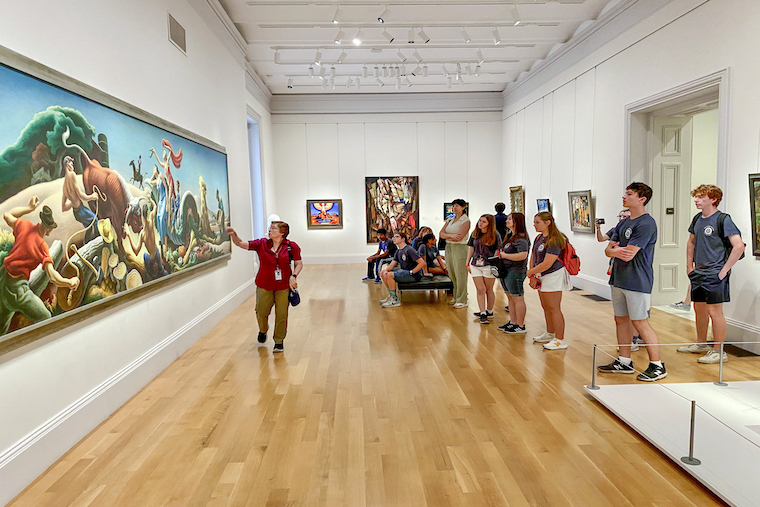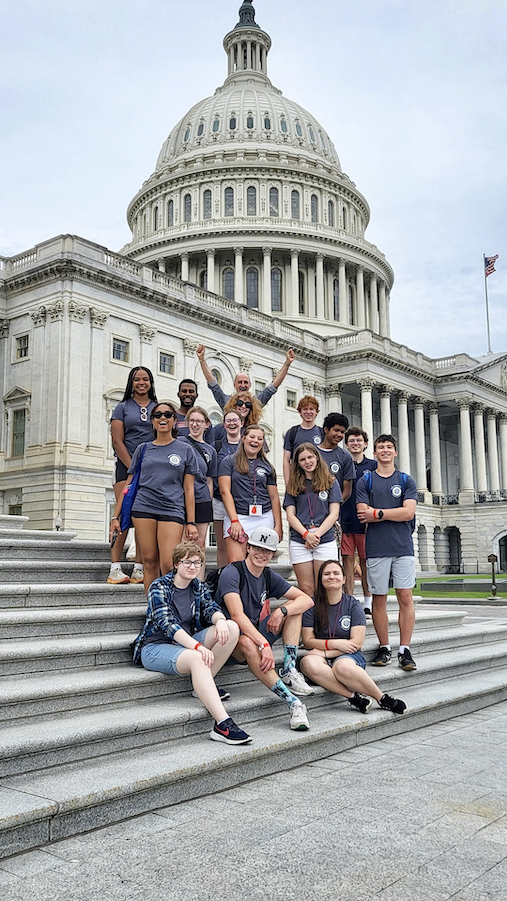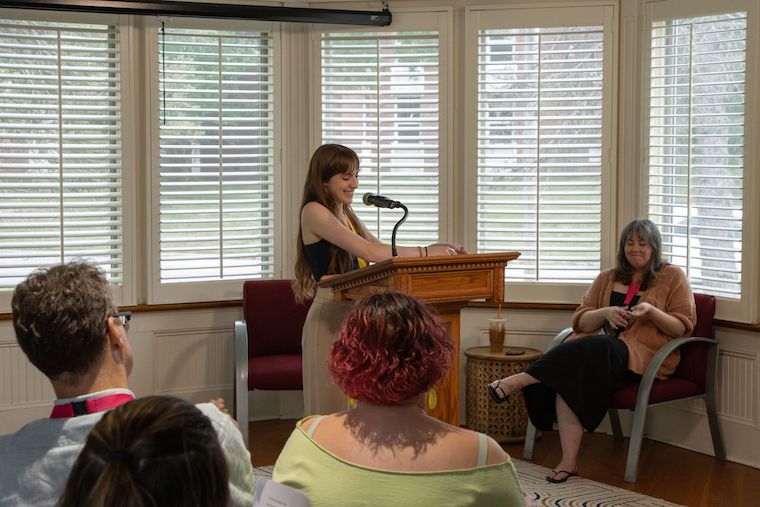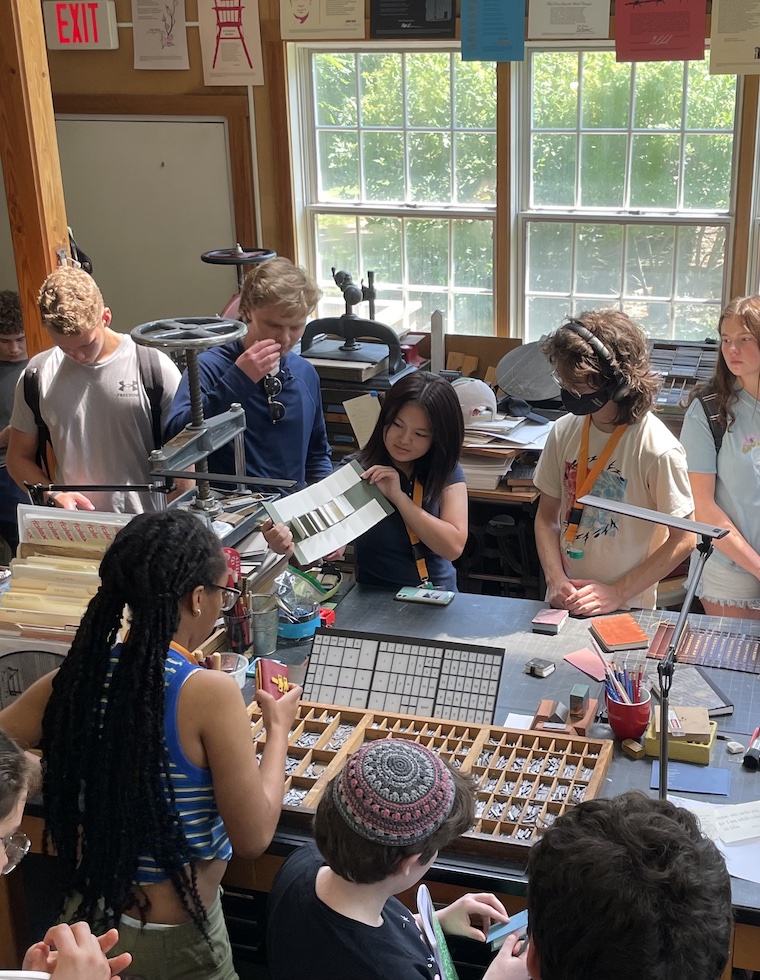High Schoolers Preview College as Historians and Writers
This year’s Young Historians and Cherry Tree Young Writers Conferences saw record attendance from across the country.

Washington College concluded two of its annual summer conference programs for high schoolers last week. The Rose O'Neill Literary House's Cherry Tree Young Writers' Conference and the Starr Center for the Study of the American Experience's Young Historians' Conference, both give young students a jump start as they consider entering college. The week-long residential experiences saw landmark attendance this year and offered not only academic enrichment but also a taste of college life for the young attendees, aligning with Washington College's mission to foster intellectual curiosity, critical thinking, and a commitment to lifelong learning.
As soon as they arrived on campus, students were immersed in a challenging academic environment that mirrored college expectations. The intensive workshops exposed participants to rigorous coursework, engaging panels with published authors and community activists, paper and print making workshops, walking history tours, and even a visit to the nation's capital to peruse the Library of Congress.
 The Cherry Tree Young Writers' Conference provided a platform for students to explore
different facets of creative writing, experimenting with genres like poetry, fiction, or
journalism.
The Cherry Tree Young Writers' Conference provided a platform for students to explore
different facets of creative writing, experimenting with genres like poetry, fiction, or
journalism.
Caleb King, a rising senior from Annapolis, Maryland, who participated in Cherry Tree's journalism workshop withing the conference, noted that the program has expanded his writing repertoire considerably. Faris Shamma, another rising senior from Syria who is living in upstate New York, echoed this sentiment about the poetry workshop.
“It's been helpful to learn the professional words for writing styles I've already been doing at home on my own,” he said and noted the experience had pushed him to expand on his writing style.
Catherine Cullen, a rising junior from Berlin, Maryland, who participated in the fiction program, found the writing prompts engaging, particularly the one where students were asked to rewrite the Cat in the Hat from the perspective of Sally, the young girl who, together with her brother, lets the cat into their house and then tries to contain the chaos. “I had a lot of fun with that one,” she exclaimed.
The Young Historians found their weeklong experience engaging in new ways as well. Titled "History off the Page," the goal of Young Historians is to foster a better understanding of our country's shared history. Conference leaders had participants exploring history through architecture, archival documents, material culture, excursions, and interviews.

“I didn't know what to expect from this program, but I've learned a lot,” said Christopher Poletti, a rising senior from Columbia, Maryland. “This program has been focused on the community rather than just raw history. Engaging with the community throughout the program was different [from other similar conferences I've attended].”
Bellamy Fitzgerald, a rising junior from Gainesville, Florida, found the conference while looking for opportunities to expand her summer studies in the greater Washington D.C. area, as she's hoping to come to the region for college.
“I was looking for a program where I wasn't lectured so much,” said Fitzgerald, who added that she really loved visiting the Library of Congress. “Other programs I've done, they were just strictly lectures all day. I really enjoyed that we were in the field here and outside of a classroom.”
Beyond academics, the conferences offered a taste of what it is like to be a college student - living in dorms, dining in the cafeteria, and utilizing campus facilities for research. Students also interacted with college faculty who led workshops and discussions. They were able to ask questions, gain insights into different academic paths, and learn about faculty expectations.
 Jack Gisvold, a participant in Cherry Tree's fiction workshop, was impressed with
the way the program challenged him, particularly regarding scene and character work. Visiting
from Pennsylvania, Kazi Bhuiya found it “great to learn new methods of fiction writing
and hear directly from published authors.”
Jack Gisvold, a participant in Cherry Tree's fiction workshop, was impressed with
the way the program challenged him, particularly regarding scene and character work. Visiting
from Pennsylvania, Kazi Bhuiya found it “great to learn new methods of fiction writing
and hear directly from published authors.”
The workshops also provided opportunities for self-discovery and confidence building. By receiving feedback from instructors and peers, students refined their skills and gained the confidence to navigate the challenges and opportunities that college presents.
Panelists like Susan Muaddi Darraj, an award-winning writer of books for adults and children, stressed the importance of not waiting for inspiration to strike and encouraged young Cherry Tree participants to keep a writing practice going “no matter what.”
Jason Fagone, a bestselling author and journalist whose work has appeared in The New York Times Magazine, The Atlantic, and GQ, offered more practical advice. “Write the bad draft as fast as you can,” he said, when asked by students how to overcome writer's block.
The Young Historians panel discussion titled “How can you make History in the world?” offered another dimension to the student experience. This panel, focused on the theme of how to be an oral historian, provided students with valuable insights into the power of storytelling and activism. Students learned how to ask good questions to elicit personal stories and gained practical advice on navigating social change.
Panelist Stan Salett, a civil rights activist most known for his work organizing the 1963 March on Washington and his work creating the Upward Bound and HeadStart programs, emphasized the importance of studying anthropology and social sciences to understand “where the real power is.” When a student asked how to deal with someone close who opposes their activism, Salett advised students that “as an activist you're involved with institutions, not just people,” and stressed studying the power dynamics that come into play when seeking to make change.
“I cannot think of any other program wherein ambitious and curious emerging scholars can explore history through so many different mediums in such a short amount of time,” said Victoria Barnett Woods, the associate director for experiential learning and programs at the Starr Center.
Roy Kesey, associate director of the Washington College Rose O'Neill Literary House, was pleased with this year's record-breaking number of Cherry Tree participants – 49 students—and how that illustrated one of the main things they want students to take away from the conference.
“We want them to learn tricks and techniques from the guest faculty in workshop, but we also want them to know that we are their people—that even though as writers we all do our essential work alone, there is a community of people who understand the struggles involved, and that by coming to the conference, they have joined that community,” said Kesey.
To request more information on either of the programs, interested participants can reach out via email to the Starr%20Center and the Lit%20House, directly.
- Dominique Ellis Falcon